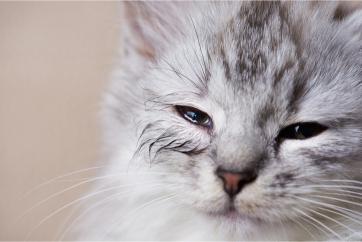Common Feline Allergies

You probably know people who are allergic to cats, but did you know that cats can have allergies as well? The Gentle Vet sees all sorts of feline allergies and wants to help you better understand how to recognize and treat the problem in cats.
Allergies in Cats
Allergies basically refer to the same process no matter what species you might be. An allergic reaction is the body’s immune system mounting a response to allergen such as a protein, dust, or pollen.
While us humans tend to deal with respiratory symptoms, feline allergies can manifest themselves in a few different ways. The most common symptoms of cat allergies include:
- Skin: The most common symptom of cat allergies, itchy skin can lead to overgrooming, hair loss, irritation, and infection.
- Gastrointestinal: Allergic cats may also experience symptoms like vomiting or diarrhea.
- Respiratory: Less commonly, feline allergies can cause upper or lower respiratory symptoms and watery eyes.
No matter how they appear, though, allergies are no fun.
The Big Three
When our professional staff considers allergies for our feline patients, there are typically three main categories that we explore.
- Flea allergies: Flea allergic dermatitis is extremely common in cats. This particular condition occurs when the pet is allergic to flea saliva, resulting in an itchier-than-typical cat. Flea allergies in cats often appear as hair loss, redness, and scabbing. This can occur anywhere on the body, but we often see it near the base of the tail and around the neck. Not seeing fleas doesn’t rule out flea allergies—cats are such efficient groomers that the only way to be sure is to keep the pet on quality flea prevention.
- Food allergies: Cats can have food allergies (although they are less common than you might think). Typically, a food allergy is to a specific protein type. Fish, chicken, beef, or soy are all common allergens. Food allergic cats are often itchy, licking, biting, and causing hair loss and sores.
- Environmental allergies: Allergies to things in the environment can appear similarly to food or flea allergies. Overall itchiness, hair loss, skin sores, infections, and even ear infections can appear. Environmental allergies are often to dust, pollens, or dander (yes, even human dander).
If you think feline allergies are plaguing your cat, it is best to make an appointment to see us so that we can get started helping your cat. While we can’t fix allergies typically, we have some good ways to help manage them and keep your kitty more comf
